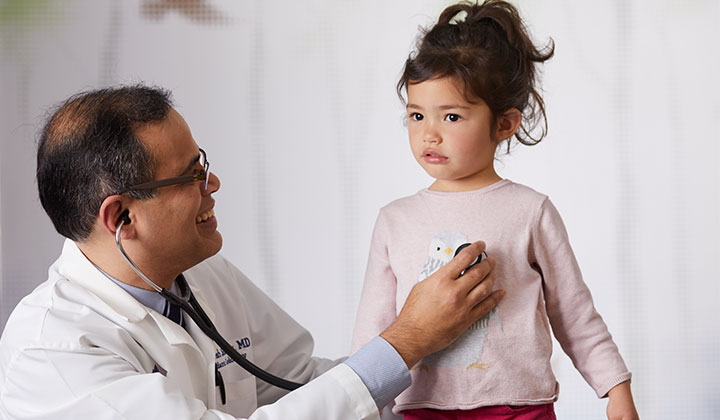
Pediatric Arrhythmia
If your child has an abnormal heartbeat (arrhythmia), Mount Sinai Kravis Children’s Heart Center is here to answer your questions and provide world-class treatment.
With compassionate, comprehensive care, we may be able to cure your child’s abnormal heart beat using minimally invasive procedures.
About Arrhythmia
An arrhythmia is any abnormal heart beat. Many arrhythmias are not serious and don’t require treatment. However, other types do require treatment.
There two main categories of arrhythmia:
- If the heart beats abnormally fast, it is a tachycardia.
- If the hearts beats too slowly, it is a bradycardia.
Your child may have one the following types of tachycardia:
- Atrial flutter— a type of short circuit rhythm in the upper chambers of the heart (atria). Rare except in children who have had heart surgery
- Sinus tachycardia—a fast heart beat that uses the normal electrical conduction pathways of the heart. Many causes, including when a child has a fever, elevated thyroid levels, or is dehydrated
- Supraventricular tachycardia (SVT)—one of the most common types of abnormal heart rhythms. is Usually caused by a short circuit rhythm in the heart
- Ventricular tachycardia— a fast heart rhythm from the lower chambers of the heart (ventricles). Uncommon in children
- Wolff-Parkinson-White syndrome (WPW)—a type of short circuit with an extra tiny electrical connection between the upper and lower chambers of the heart. Can lead to SVT and more serious heart rhythm issues
Your child may have one the following types of bradycardia:
- Complete heart block—a slow rhythm caused by miscommunication between the upper and lower chambers of the heart. Some babies are born with this condition. Other children may develop it from an infection like Lyme disease.It also may be acquired during heart surgery.
- Sinus bradycardia—a slow rhythm that uses the normal electrical conduction pathways of the heart. Develops in adolescents who are trained athletes and is a sign of good cardiac health.
- Sinus node dysfunction—a slow rhythm. This can happen after certain types of heart surgery.
Diagnosis
We use certain tests to diagnose heart beat rhythm problems in children, such as:
- Echocardiogram—an ultrasound of the heart that shows your child’s heart structure and function.
- Electrocardiogram (ECG or EKG)—a way to record the electrical activity of your child’s heart by attaching small stickers to your child’s skin on the chest, arms, and legs.
- Electrophysiology testing—minimally invasive procedure performed by our electrophysiologists for both advanced diagnostics and treatment. We insert thin tubes (catheters) into the blood vessels and guide them into the heart where we perform an EKG.
- Event recorder—a heart activity monitor that your child may wear continuously for several days or weeks to record heart rhythm activity that occurs intermittently. Some event recorders are very small and can synch with your smartphone.
- Exercise (stress) test—shows how your child’s heart reacts during exercise such as running on a treadmill or peddling a stationary bike.
- Holter monitor—a portable accessory to monitor and record heart activity. Your child may wear the monitor for 24 hours.
- Implantable event recorder—a tiny device that can be implanted under your child’s skin in the chest. Used when extra-long term monitoring is needed.
Treatments We Offer
Your child’s treatment depends on the type of abnormal heart beat diagnosed. We will help you understand the condition and your child’s treatment options.
Treatment for fast heart rhythm (tachycardia)
If your child’s heart beat rhythm is too fast, there are several treatment options available, based on your child’s needs.
- Conservative approach—for infrequent abnormal rhythms that are not serious, no specific treatment is necessary.
- Medications—if rhythm problems are more frequent or serious, medications may be effective in regulating the heart rhythm.
- Electrophysiology study and ablation—to treat more bothersome or life-threatening rhythm problems, we use this minimally-invasive procedure to manage and even cure the heart rhythm conditions. To do the electrophysiology study, we thread small wires through the veins in the groin into the heart chambers. This allows us to record the heart’s electrical signals and diagnose the precise cause of the arrhythmia. During the same procedure, we can also perform an ablation. Ablation uses either radiofrequency energy or a freezing process to block the abnormal electrical pathway that caused the arrhythmia. In most cases, ablation permanently cures the arrhythmia.
Treatment for slow heart rhythm (bradycardia)
If your child has a slow heart beat with no symptoms, especially if it is sinus bradycardia, no treatment is necessary.
However, if the rhythm is causing symptoms, or your child’s heart rate is very slow, we may recommend a pacemaker.
- The pacemaker provides regular electrical impulses to cause the heart to beat regularly. We implant this small device under the skin and attach to the heart with small wires.
Treatment for ventricular tachycardia and potential life threatening heart rhythms
If your child has a serious ventricular tachycardia, or a life-threatening heart rhythm disturbance, an implantable cardiac defibrillator (ICD) may be a treatment option.
- The ICD can apply a shock to the heart to restore normal rhythm. It is a small device similar to a pacemaker. For serious heart rhythm conditions, we insert the ICD under the skin and attach to the heart with wires.
Why Choose Children’s Heart Center
At Children’s Heart Center, we specialize in complex cases that require a high level of expertise. We routinely treat arrhythmias in children of all ages, as well as adults and even newborns. Our highly qualified specialists are dedicated to providing your child the best possible electrophysiology treatment. And we offer timely and streamlined appointments.
Children’s Heart Center also offers excellent support staff. Our nurse practitioners, sonographers, and registered nurses specialize in pediatric cardiology. In addition, our team of counselors and social workers will help you handle everything from insurance questions to planning for your child’s ongoing care at home.
